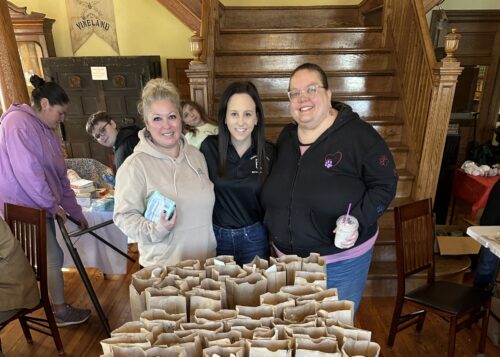A Leading Lady
In a nod to our healthcare workers and teachers, we salute Clara Barton, a trailblazer in both professions.

Clara Barton may be best known as the founder of the American Red Cross, but the brief time she spent in New Jersey as a teacher solidified her connection to the state forever.
Barton was born in North Oxford, Massachusetts on December 25, 1821, the youngest of Stephen and Sarah Stone Barton’s five children. The Clara Barton Museum website notes complications in her childhood that included a mother “not kind to her,” siblings who were “more parents than playmates” and a severe shyness that led her parents to arrange for her to meet with phrenologist L.N. Fowler, who “suggested Barton become a teacher to face her fears.”
She excelled in reading and spelling at school, but it’s reported that she established only one friendship due to her shyness. Her love of storytelling, particularly in listening to her father’s tales about his life in the military, would prove helpful in her initial occupation. Her careful attention in nursing her brother David back to health after a serious fall would foreshadow her humanitarian service during the Civil War.
Earning her teaching certificate in 1839, she became, according to the Clara Barton Birthplace website “at the age of seventeen…a teacher in a one-room schoolhouse in North Oxford…Clara earned praise when she refused to physically punish her students yet was able to produce disciplined scholars.”
Her teaching duties in her home state lasted 12 years, after which “she decided to further her own education and in 1850 enrolled at the Clinton Liberal Institute in Clinton, New York, for a year of study,” the Birthplace website explains. But after receiving her degree, according to the Museum website, “she felt she couldn’t go back to her original school for fear of regressing in life.”
By 1852 she arrived in the Garden State and, depending on which source you consult, either visited a friend or was hired for a teaching position in Hightstown. While there, she discovered Bordentown, a location where, as the Hidden New Jersey website notes, “far too many children weren’t getting an education because they couldn’t afford private school tuition.”
An online posting by the Metuchen-Edison Historical Society explains that “in those days parents paid a certain bargained sum for the education of each boy and girl, according to their age and the number of subjects they studied. The teacher received the money,” usually by billing the parents. Barton was determined to provide free education that was subsidized by the municipality of Bordentown.
The Museum website claims that “the local school board was skeptical of her ability to teach what they considered to be incorrigible students,” but Hidden New Jersey indicates she was able to convince the board and “in 1852 the town allowed her to start her new school in a one-room building that predated the Revolution.” This was the first public school in New Jersey and one of the earliest in the country.
 Barton initially had only six students when she began teaching in Bordentown, but by the end of the term the student body had increased to 200. Sources indicate that enrollment soon reached 600 and an additional teacher was required. Some sources report that each teacher was earning an annual salary of $250.
Barton initially had only six students when she began teaching in Bordentown, but by the end of the term the student body had increased to 200. Sources indicate that enrollment soon reached 600 and an additional teacher was required. Some sources report that each teacher was earning an annual salary of $250.
Online sources agree that the town was quite impressed by what Barton had accomplished and agreed to spend $4,000 on a larger school facility referred to by the Birthplace website as Schoolhouse Number One.
Prior to its opening in fall 1853, however, Barton found that she was not appointed principal of the school as she had anticipated. Hidden New Jersey informs us that “according to the Bordentown Historical Society website, a lengthy bout with laryngitis caused her to miss a few months of school, and in that time, local officials replaced her with a male principal at a salary reported to be twice what she was being paid.”
Instead of principal, Barton was relegated to the role of assistant, a position Hidden New Jersey claims “she found distasteful.” Some online sources indicate that she initially accepted the position but at one point resigned.
The Museum website comments that her “passion for education prompted her to state that ‘I may sometimes be willing to teach for nothing but if paid at all, I shall never do a man’s work for less than a man’s pay.’ ”
Barton made plans to move to Washington, DC, where she pursued work outside of the field of education. Her sojourn resulted in a job at the U.S. Patent Office as one of the first women to hold a government job and earn a salary equal to a man’s.
With the election of Democrat James Buchanan as president in 1857, however, Barton was fired for her Republican affiliation and she returned home to Massachusetts. By 1861, with Abraham Lincoln in office, she was rehired by the Patent Office, but her most significant accomplishments would not be achieved there.
With the Civil War raging, Barton turned her attention to aiding Union troops. She collected medical supplies, sometimes reaching out to friends in Massachusetts and New Jersey to obtain them. Persevering through the bureaucratic red tape, she eventually received the permissions necessary for her to undertake her new job.
According to the Museum website, she was able to “deliver supplies to the troops at the field hospitals set up outside the Battle of Cedar Mountain in Virginia. She arrived at the camp and immediately got to work. She worked for days on end, without rest, then collapsed with exhaustion when she returned home. Throughout the war, Clara continued this pattern—collect supplies, visit field hospitals (and later on the battlefields themselves) and work fervently (see her quoted words on these pages), then collapse, exhausted, ill, and at times depressed.
Those she treated during the war included some of the students she had taught in North Oxford during her early years as an educator. The Museum website offers her comments about her former pupils: “They were faithful to me in their boyhood, and in their manhood faithful to their country.”
* * *
Local American Red Cross Blood Drives
Friday, April 16
The Alms Center
1 Martin Luther King Jr Way
Bridgeton, NJ 08302
1–6 p.m.
Greenwich Presbyterian Church
630 Ye Greate Street
Greenwich, NJ 08323
2–7 p.m.
Wednesday, April 21
Vineland High School
2880 East Chestnut Avenue
Vineland, NJ 08360
9 a.m.–7 p.m.
Monday, April 26
Millville Elks Lodge 580
1815 E. Broad Street
Millville, NJ 08332
2–7 p.m.
Wednesday, April 28
Vineland Performance
482 Tuckahoe Rd
Vineland, NJ 08360
2–7 p.m.
Thursday, April 29
Inspira Fitness Connection
1430 W. Sherman Avenue
Vineland, NJ 08360
9 a.m.–7 p.m.
Vineland Public Library
1058 E Landis Ave
Vineland, NJ 08360
11:30 a.m.–4:30 p.m.











